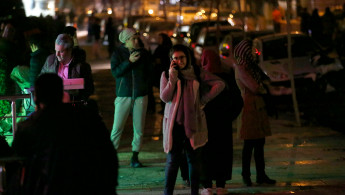Pregnant woman dies of shock after Iran earthquake
The epicentre of the quake, which struck shortly before 11:30 pm (2000 GMT), was just 40 kilometres (25 miles) west of the capital, according to the seismological centre of the University of Tehran.
The woman died as she ran out of her home in the city of Malard, close to the epicentre, the county's prefect said.
"Ninety-seven people were injured – 50 in Alborz, 34 in the capital and 12 in Saveh," said Morteza Salimi, head of the Iranian Red Crescent's Relief and Rescue Organisation.
The quake caused no major damage but tens of thousands of people spent the night outside for fear of aftershocks.
Many of them did so in their vehicles with the engines switched on for warmth in the wintry conditions, exacerbating the thick smog that has enveloped the capital all week.
 |
The quake caused no major damage but tens of thousands of people spent the night outside for fear of aftershocks |  |
Petrol purchases in the six hours after the quake reached 10 million litres (2.64 million gallons), more than double the average full day sales even though it was in the middle of the night, the national fuel distribution company said.
Average airborne concentration of the finest and most hazardous particles (PM2.5) rose to 170 microgrammes per cubic metre, with peaks of 194 microgrammes in some neighbourhoods, Tehran municipality said.
That is some seven times higher than the World Health Organisation recommended maximum of 25 microgrammes per m3 over a 24-hour period.
Iran sits atop several fault lines, and Wednesday's quake is the latest in a series to have hit the country in recent weeks.
A 6.2-magnitude earthquake struck the southeastern province of Kerman on December 13, leaving at least 18 people injured.
On November 12, the western province of Kermanshah was hit by a 7.3-magnitude quake that killed 620 people.
Iran's deadliest quake in recent years was a 6.6-magnitude tremor that struck the southeast in 2003, decimating the ancient mud-brick city of Bam and killing at least 31,000 people.
In 1990, a 7.4-magnitude quake in northern Iran killed 40,000 people, injured 300,000 and left half a million homeless, reducing dozens of towns and nearly 2,000 villages to rubble.





 Follow the Middle East's top stories in English at The New Arab on Google News
Follow the Middle East's top stories in English at The New Arab on Google News

![Israeli forces ordered bombed Gaza's Jabalia, ordering residents to leave [Getty]](/sites/default/files/styles/image_330x185/public/2176418030.jpeg?h=a5f2f23a&itok=_YGZaP1z)
